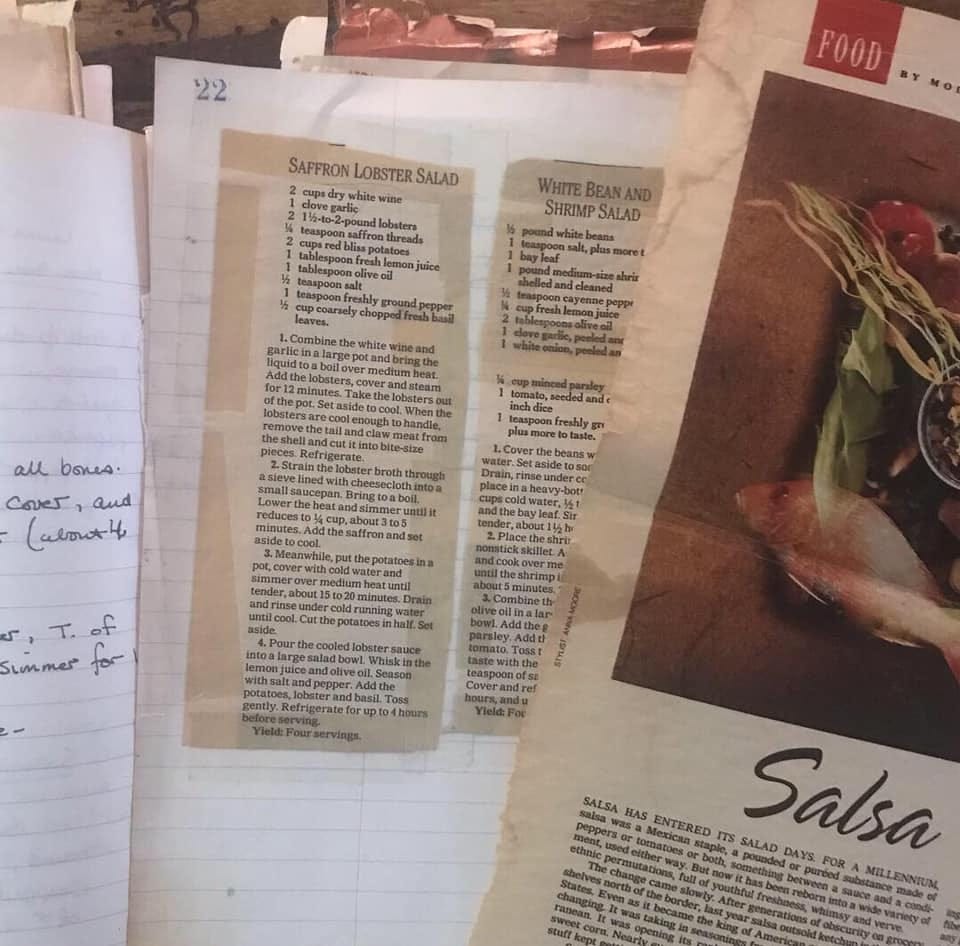They were all she wanted, and all she asked me for.
But our lilacs were over days earlier, going dark on the stem for another year. So I parked near the small, dank apartment she was renting in order to be close to the hospital, and walked all over Washington Heights looking for an open florist who might have something left. I didn’t even care what condition they were in; I just wanted to bring her what she asked me for. I settled for two dozen, long-stemmed white roses that the florist adorned with baby’s breath, and stuffed into a long floral box of the sort one sees in old movies. It was pouring down rain —- the kind of drenching downpour associated with early summer —- and I woke that morning thinking about canceling for the following week, but I didn’t. I was soaked when I arrived, when the apartment door creaked open and she greeted me, looking like Molly: tall, imposing, towering over me by a good foot, a bear of a woman dressed in a soft denim caftan. I expected the dogs, her beloved Bearded Collies, to run out into the hallway, but: two herders in a city apartment. Not a good idea. So, no dogs, except for the large stuffed one on her bed, the sight of which made me weep, which I did in her bathroom, out of view.
Molly had been living alone in upper Manhattan for a few months at that point. On the other side of a liver transplant a few years earlier —- to hear her tell it, she went for an annual checkup to the Child Hepatologist who cared for her ancient Hep C, which was long in remission, and he told her Cancer, I’m putting you on the transplant list today —- she could no longer live in the Rensselaerville New York home on the river that she loved. A discovery, after the transplant was made: her original, cancerous liver had metastasized to her adrenal glands which, when the transplant surgery was done, attacked the new liver.
You can’t make this shit up, she said over the phone, when she told me that her plan for publishing a list of small, topical cookbooks would have to wait, along with her memoir.
Molly and I first met in the early 2000s, when we were asked to judge a community cooking contest in northern Connecticut and someone put a plate of unidentifiable brown things in front of us, made by a woman who said she had slaved over them for hours.
Please God let it be a meatball, Molly said, after the woman walked away.
It suddenly struck me as so utterly ridiculous, so stupidly human, that two people should be given the task of formally judging food made by someone else. Food competitions, once you get out of the state fair/county’s biggest tomato thing, fall flat. As a species, we have enough trouble sustaining ourselves and the people we love without reducing each other to failures for the density of our tea cakes.
So we became close, almost instantly. Food. New York in the seventies and eighties. New York baseball. An unfortunate fondness for alcohol. Difficult relationships with mothers. Difficult relationships with notoriously competitive food colleagues. Difficult friendships that played out childhood abuses, over and over again. I never told her that she’d been my hero back in the late eighties, when her weekly, multi-recipe column appeared in the Sunday New York Times, and I, recently split from someone I loved who did not love me back, locked myself in my tiny walkup kitchen, leaving only to attend cooking school at night and work at the original Dean & Deluca during the day.
There were flowers and dogs and a slow walk down to the river. There was a subtle carnality to the afternoon, a certain visceral sensuality born of light and air and the sound of water.
Our lunches were epic, multi-hour affairs, and although she drove me crazy a lot of the time (and, I am certain, I her), when she decided to start a food writer’s conference upstate, I was all in, along with Carolyn Forche, Naomi Duguid, Jonathan Gold, and others. One of our last formal lunches took place on the terrace of her Rensselaerville home, and included the writer Suzanne Lessard, author of The Architect of Desire, which is one of the first books to show me that writing about that which shall go unspoken is a dangerous, precarious, important business. Lunch was simple: salad, cold pea soup, poached chicken. There were flowers and dogs and a slow walk down to the river. There was a subtle carnality to the afternoon, a certain visceral sensuality born of light and air and the sound of water.
Keep reading with a 7-day free trial
Subscribe to Poor Man's Feast to keep reading this post and get 7 days of free access to the full post archives.






